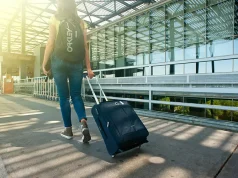
Travel is one of the most enlightening experiences. It pushes you beyond your comfort zones and introduces you to new cultures, foods, and perspectives. However, whether you’re jetting off to a remote island or going on a local hiking expedition, safety should never take a backseat. This is especially true in the recreational travel sector where safety protocols often differ from ‘regular’ travel.
Then comes the element of electricity and power sources during traveling. A short circuit, a loose wire, or an exposed cable can ruin your well-planned vacation. That’s where experts like The Local Electrician swoops in, but more on that later.
Choosing Your Travel Destination
The process of choosing your travel destination goes beyond picking out attractive locales. It involves careful analysis of the potential risks and hazards that exist in your chosen destination. This requires a great deal of research into the political climate, crime rates, and overall safety of the area.
Safety measures begin before you even pack your bags. Familiarize yourself with local customs and traditions to avoid unwittingly offending locals or breaking any laws. Check up-to-date travel advisories issued by reputable institutions such as the World Health Organization (WHO). Is there civil unrest? A disease outbreak? Knowing these details helps formulate a safe and informed travel plan.
If possible, obtain firsthand information from people who’ve visited before. Engage with fellow travelers online for useful advice. Are there any neighborhoods you should avoid? Are there scams targeting tourists? This kind of knowledge can prove indispensable.
Remember, certain attractions may look photoshoot-worthy but could be dangerous due to unforeseen reasons such as wild animals, high tide, etc. Adventurous as you may be, it’s crucial to prioritize safety over thrill.
Emergency Contact Information
In case of emergencies while traveling, having quick access to important contact information is critical. Therefore, it is recommended for travelers to keep a list containing relevant phone numbers including local ambulance services, police stations, and nearest embassy or consulate.
Understanding the country’s emergency services is also necessary. Not every nation operates on 911. Researching this beforehand can save precious time during emergencies.
Keep digital and physical copies of your identity proof and travel documents safe. In case they’re lost or stolen, having backups ensures that verifications and replacements are hassle-free.
Finally, leave a copy of your itinerary with someone back home. Keeping someone informed of your whereabouts makes it easier to track and assist you in case of any unforeseen circumstances.
Handling Travel Documentation
Navigating the complexities of travel documentation is critical. For a smooth and worry-free journey, ensure your passport, visas, and other necessary papers are in order. Your passport should have at least six months’ validity beyond your estimated return date.
Visa requirements depend on your nationality and travel destination. It’s important to allot sufficient time for visa processing, especially in conditions where complex deliberations may ensue. Equally essential is organizing travel tickets in advance, verifying departure dates, locations, and times to prevent any last minute panic or inconvenience.
- Keep digital as well as physical copies handy for all documentation.
- Always bring along an identification card that contains your photo and address.
- Ensure you have permits for any special activities like diving or wildlife photography.
Handle all documents with extreme caution as they are pivotal to a secured journey. Ultimately, efficient handling of travel documents creates a seamless velocity where the unexpected can be handled with relative ease.
Staying Safe in Public Spaces
When overseas, understanding some basic safety protocols can go a long way in ensuring a pleasant experience. Be cautious of your surroundings to protect yourself from both petty and serious crimes. This means avoiding deserted areas at night and being aware of your belongings in crowded public spaces.
The use of tech gadgets openly could draw unwanted attention potentially leading to thefts. Hence, only take them out when required. Furthermore, keep valuable items such as jewelry and expensive electronics securely locked in your accommodation if they aren’t needed for the day.
Tips for safeguarding belongings:
Avoid flashiness: Refrain from displaying flashy jewelry or cash which might attract thieves.
Use of Safety Vaults: Utilize safety lockers offered by many hotels and lodges.
Smart Storage: Conceal your cash, credit cards, and passports in inside pockets or money belts.
In crowded transport terminals, ensure your luggage is always within sight. Using quality locks for suitcases can deter theft during transit. Lastly, never leave a drink unattended to prevent any drink tampering scenarios.
Navigating Local Culture Respectfully
Traveling provides an opportunity to experience diverse cultures firsthand. Understanding and integrating into local culture can provide a rewarding and immersive experience.
Learn some phrases in the local language like ‘hello,’ ‘thanks,’ or ‘excuse me.’ Bear in mind, social norms and customs differ everywhere. Therefore, respect for the local lifestyle and traditions contributes significantly to a harmonious experience.
- Adhere to the dress code. Modesty is valued in certain cultures; therefore, try blending in rather than standing out.
- Avoid discussing sensitive topics such as politics and religion.
- Request permission before photographing locals or sacred sites.
If uncertain about any cultural nuances, seek advice from locals or conduct personal research. Being respectfully cognizant of a culture’s norms can foster connections with local inhabitants and enrich your travel experience phenomenally.
Weather and Environmental Conditions
Considering the weather and environmental conditions is another safety protocol when planning for travel. Having an understanding of the climate will help decide what clothes to pack. Dressing appropriately ensures comfort and reduces health risks related to heat strokes or hypothermia.
The environmental factors may also considerably impact your activities. For instance, trekking trails could become unsafe in heavy rains due to mudslides, making it impassable or highly risky. Certain water sports are also forbidden during specific seasons due to maritime conditions.
- Regularly check weather updates.
- Carry emergency supplies like a torch, batteries, additional food, and a raincoat depending on the planning.
Remember, weather changes can sometimes be sudden and severe in certain places. Hence, being prepared and flexible with your plans based on the current conditions can make a huge difference in your travel experience. The experts on this website also point out that voltages and power supplies differ around the world as do safety standards.
Food and Water Safety Measures
Pleasurable though it may be, eating in a foreign land can sometimes lead to stomach ailments or food poisoning. The change in water source and diet could upset your digestive system. Avoid drinking tap water unless it’s labeled safe; opt for bottled water instead. If in doubt, boiling water before consumption is safe practice.
Discovering local cuisine is one of the most fascinating experiences for travelers. However, aim for hygienic manners of consuming it. Ensure the food is freshly cooked and served hot.
- Avoid uncooked or undercooked meat.
- Steer clear from unpeeled fruits and uncooked vegetables.
- Consuming dairy products should be handled with caution in countries where milk isn’t generally pasteurized. Prefer packaged items available at registered outlets.
Remember that certain cuisines could be too hot or spicy for you to handle. Always carry medicines related to dietary disorders while traveling to avoid discomforts like acidity or diarrhea.
The Final Word
Safety is multifaceted when it comes to recreational travel – from choosing the right insurance policy to health precautions and cultural respect. By treating safety as a priority rather than an afterthought, you’re setting yourself up for a rewarding, stress-free journey. As the old adage goes, ‘Prevention is better than cure’, nothing rings truer than when it comes to ensuring safety during travel.





